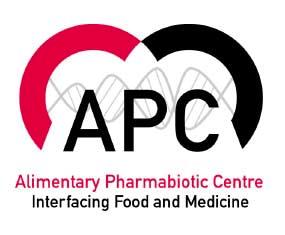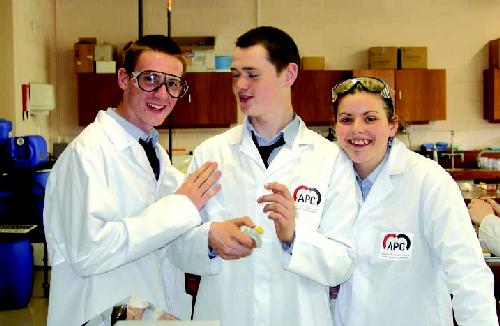| 2006 |

|
YEAR BOOK |
University College Cork
|
Alimentary Pharmabiotic Centre
|


Thus, the work of the APC is of tangible importance to several industries including human health maintenance, agriculture and animal husbandry and is pitched at the interface of both the food and pharmaceutical sectors.
There have been a number of scientific advances in the last year �
� The Pathogenicity Research core has used a few tricks from a GI pathogen, Listeria , which is very resistant to bile which normally destroys bacteria in the gut. They have identified the gene in Listeria that confers bile resistance, and used this to make selected probiotic strains more bile tolerant and help them adapt to the harsh environment of the gut.
� The Bioinformatics Team has sequenced three different probiotic bacteria strains, which will allow researchers to identify the function of specific genes, such as those that help protect against environmental stress, or that produce important chemicals that help kill pathogenic bacteria.
� The Host Response core has shown that in IBS patients, certain probiotics help polarise the immune system towards a more regulated response.
� A Cork probiotic strain, Bifidobacterium infantis 35624, which was developed by Alimentary Health, has been licenced by the Procter and Gamble Company. They have named this strain Bifantus� and have launched a test market product called AlignGI� to help even out the ups and downs of common digestive upsets such as diarrhoea, constipation, gas, bloating, or urgency. Currently this product is available in the USA. For more information you can see the website www.aligngi.com
The APC Education and Outreach team has introduced many more great projects. This year UCC's 2nd Science For All postgraduate competition was extended to include presentations to the general public from PhD students from all the science and engineering disciplines, and the UCC winner came second in the 1st national competiton of all Irish Universities, Science Speak.

We also arranged events for the general public � "Natural Solutions to Today's Medical Problems" was an evening of presentations by APC researchers to the public describing some of the recent research successes, followed by plenty of time for questions and discussion. The APC also hosted an IBS Patient Open Day in Cork University Hospital, to let patients and their families know about some of the clinical research and discoveries going on.
Please e-mail [email protected] if you would like to be added to our mailing list for newsletters and upcoming events.
Contact: Dr Sally Cudmore, General Manager Alimentary Pharmabiotic Centre,
BioSciences Institute, UCC.
E-mail:[email protected]
Web: apc.ucc.ie and microbemagic.ucc.ie
